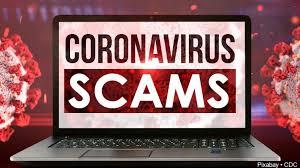Beware of Coronavirus Scams and Fraud

The Borough of Oakland urges residents, particularly those receiving benefits under the Supplemental Nutrition Assistance Program (SNAP) or other public assistance programs, to be wary of phone solicitations in which fraudsters may attempt to elicit confidential information, including bank account numbers.
The alert is based on an incident reported in Hudson County in which an individual receiving SNAP benefits received a solicitation by phone from a person claiming to represent a consulting company and, during the call, requested bank account information. Hudson County authorities issued an alert earlier this week warning residents, especially SNAP clients or applicants, to beware of any solicitations for benefits made by any person, company or agency other than its Division of Family Services.
Bergen County, N.J. authorities issued the same warning, noting such scams are designed to take advantage of vulnerable residents, particularly those in need of public services and benefits for their families and who are willing to cooperate as fully as possible to obtain the benefits. While clients of such services may not have significant financial assets, private information such as bank account numbers, social security numbers and other confidential information may be used to create fake identities and be used to further other fraudulent activities.
If you are contacted by a scammer, please notify the Oakland Police Department at (201) 337-6171.
Oakland residents also have been warned of additional scams prevalent during the COVID-19 pandemic, including:
- Contact tracing. Criminal scammers pretend to be contact tracers. The scammers send messages to potential victims saying they have been exposed to someone with COVID-19/coronavirus and need to click a link to learn more. When that link is clicked, malicious software is downloaded onto a person’s smartphone or other device, giving hackers access to their target’s private information. Legitimate contact tracers only send text messages to let a person know that they will be calling. These messages DO NOT include a link. Messages that include a link to click should be viewed as illegitimate and deleted immediately.
- Bail bond. A scammer will call a potential victim and say her or his grandchild has been arrested and ask for money for the child’s release. This type of scam is particularly dangerous, because the criminal will attempt to collect the money in person, directly from the victim.
- IRS scams. A scammer will call a potential victim and say he or she owes the government money and faces arrest if they do not pay.
- Stimulus checks. Scammers are calling and/or emailing individuals claiming to be from the U.S. Treasury Department, and offering expedited payments or assistance with obtaining an Economic Impact Payment.

